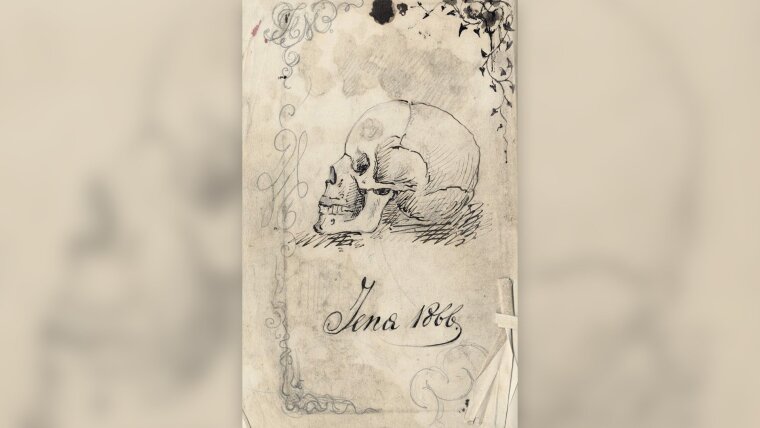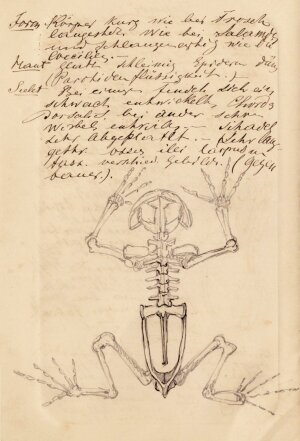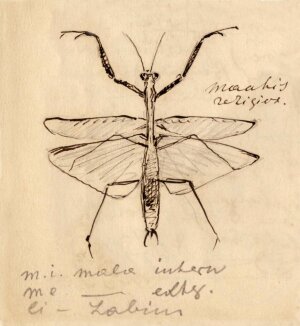
When the Russian explorer Nikolai Miklucho-Maclay attended lectures held by Ernst Haeckel and Carl Gegenbaur at the University of Jena in the mid-19th century, he recorded them with pencil and ink. Biology education specialists have unearthed these transcripts in the archives of the Russian Geographical Society and have now published them.
By Stephan Laudien
»This discovery is a sensation!«, gushes Prof. Dr Uwe Hoßfeld. The biology education expert and his colleague PD Dr Georgy S. Levit stumbled upon the lecture notes in 2018. They were taken during university courses held by anatomist Carl Gegenbaur and zoologist and evolutionary researcher Ernst Haeckel, both of whom worked at the University of Jena in the mid-19th century. The documents were found in the estate of the Russian explorer Nikolai Miklucho-Maclay, which is kept in the archives of the Russian Geographical Society in St. Petersburg. Hoßfeld and Levit have now published the two valuable sets of lecture notes in cooperation with other scientists.
Drawing of a frog skeleton made by student Nikolai Miklucho-Maclay during a lecture by Ernst Haeckel.
Image: RGO St. Petersburg/RusslandNikolai Miklucho-Maclay broke with Ernst Haeckel
»The notes give us lots of interesting insights into the history and visualization of zoology and comparative anatomy during that period«, says Uwe Hoßfeld. In fact, the two texts are the only surviving transcripts of those authors. They reflect the state of knowledge at the time and the teaching methods employed in the fields of zoology and comparative anatomy in the mid-19th century, specifically in 1865.
The notes were written by one of Haeckel’s students, Nikolai Miklucho-Maclay, who first travelled to New Guinea as an explorer in 1870 to study the indigenous Papuan population.
Miklucho-Maclay had a tense relationship with Ernst Haeckel. He was one of Haeckel’s students who assisted him on research trips. However, the Russian scholar is thought to have severed ties with his professor after questioning and scientifically refuting Haeckel’s views on human races.
»It would be fair to describe Miklucho-Maclay as the first empirical anti-racist in the natural sciences«, says Uwe Hoßfeld. His observations and experiences with the Papuan people show that Haeckel was wrong in assuming that there were different stages of development among the people of the world and therefore different human »species/races«.
It was also ironic that Ernst Haeckel himself had postulated that scientific knowledge presupposed observing and studying organisms in their natural habitat. Nikolai Miklucho-Maclay adhered to those criteria. The Russian also stayed with the people of New Guinea on several occasions.
Drawing of a praying mantis found in Miklucho-Maclay's transcript of a Haeckel lecture.
Image: RGO St. Petersburg/RusslandPreparing the records was a mammoth task
The lecture notes, which have now been published, not only reflect the state of research at the time; they also reveal Haeckel, Gegenbaur and Miklucho-Maclay to be highly competent artists and aesthetes. The notes are supplemented by numerous detailed illustrations that were apparently shown in the lectures.
»Nikolai Miklucho-Maclay created exact reproductions of the lectures in his notes«, says Hoßfeld. He sometimes wrote in German, sometimes in Russian – and his notes were full of abbreviations. Transcribing the texts was therefore a mammoth task that took three years.
Further experts from Jena were needed
This was only possible with the help of other scientists: Dr Rosemarie Fröber is an anatomist who contributed her knowledge of anatomical terminology and the context; the zoology lectures were also transcribed with the help of two other experts, Gerta Puchert and Achim Blankenburg.
Original publication:
Vorlesungen über Menschliche Anatomie von Carl Gegenbaur, THK-Verlag, Arnstadt 2022, ISBN: 978-3-945068-56-4
Contact:
Am Steiger 3
07743 Jena Google Maps site planExternal link

